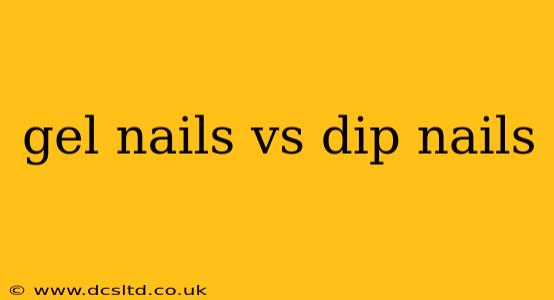Choosing between gel and dip powder manicures can feel overwhelming. Both offer long-lasting, beautiful results, but they differ significantly in application, longevity, and overall impact on your natural nails. This comprehensive guide will delve into the key differences, helping you make an informed decision about which nail enhancement best suits your lifestyle and nail health.
What are Gel Nails?
Gel manicures utilize a special type of UV-cured gel polish. This polish is applied in thin layers, cured under a UV or LED lamp after each application, and then finished with a top coat. The curing process hardens the gel, creating a durable, glossy finish that lasts for several weeks.
What are Dip Powder Nails?
Dip powder manicures, also known as SNS nails (named after one popular brand), involve dipping the nail into a colored acrylic powder after applying a base coat. This process is repeated several times to build up the desired thickness and color. A sealant is then applied to protect the finished manicure.
Gel Nails vs. Dip Nails: A Detailed Comparison
Here's a breakdown of the key differences to help you decide:
Application Process:
- Gel: Generally quicker application. Requires less precision than dip powder.
- Dip: More time-consuming application process, requiring multiple dips into the powder. Can be messier than gel application.
Longevity:
- Gel: Typically lasts 2-3 weeks, depending on nail growth and activity level. Can chip more easily than dip powder.
- Dip: Known for exceptional longevity, often lasting 4-6 weeks or even longer. More resistant to chipping and damage.
Durability:
- Gel: Moderate durability; prone to chipping, especially on longer nails.
- Dip: High durability; much less prone to chipping than gel. Offers superior strength and protection.
Nail Health:
- Gel: Less damaging than dip powder if proper removal techniques are used. However, excessive UV exposure can be detrimental to the skin and nails.
- Dip: More likely to cause nail thinning and damage with improper application and removal. The repeated filing and buffing during removal can weaken the nail plate.
Cost:
- Gel: Generally less expensive than dip powder manicures.
- Dip: Typically more expensive due to the materials and longer application time.
Removal Process:
- Gel: Requires soaking in acetone to soften and remove the gel.
- Dip: Requires filing and buffing, which can be harsh on natural nails if not done carefully by a skilled technician.
How Long Do Gel and Dip Nails Last?
The longevity of both gel and dip nails depends on several factors, including nail growth rate, how frequently your hands are exposed to water, and the quality of the application. Generally, gel nails last 2-3 weeks, while dip powder nails often last 4-6 weeks or more.
Are Dip Powder Nails Bad for Your Nails?
Dip powder nails are not inherently bad for your nails. However, improper application and especially aggressive removal techniques that involve excessive filing can cause significant damage, leading to thinning and weakening of the nail plate. Choosing a qualified and experienced nail technician is crucial to minimizing the risks.
Are Gel Nails Bad for Your Nails?
Similar to dip powder, gel manicures themselves aren't inherently harmful. The concern lies primarily with the UV exposure during the curing process. Prolonged UV exposure can potentially lead to skin damage and an increased risk of skin cancer. Using a low-UV lamp and applying a sunscreen to your hands before the treatment can mitigate this risk. Improper removal can also cause damage.
Which Manicure Is Better for Your Nails?
The "better" choice depends entirely on your individual needs and preferences. Gel nails offer a faster, less expensive option with less potential for damage if removed correctly. However, if you prioritize longevity and extreme durability, dip powder might be a better fit. Always prioritize finding a skilled and experienced nail technician, regardless of your choice, to minimize the risk of damage to your natural nails.
